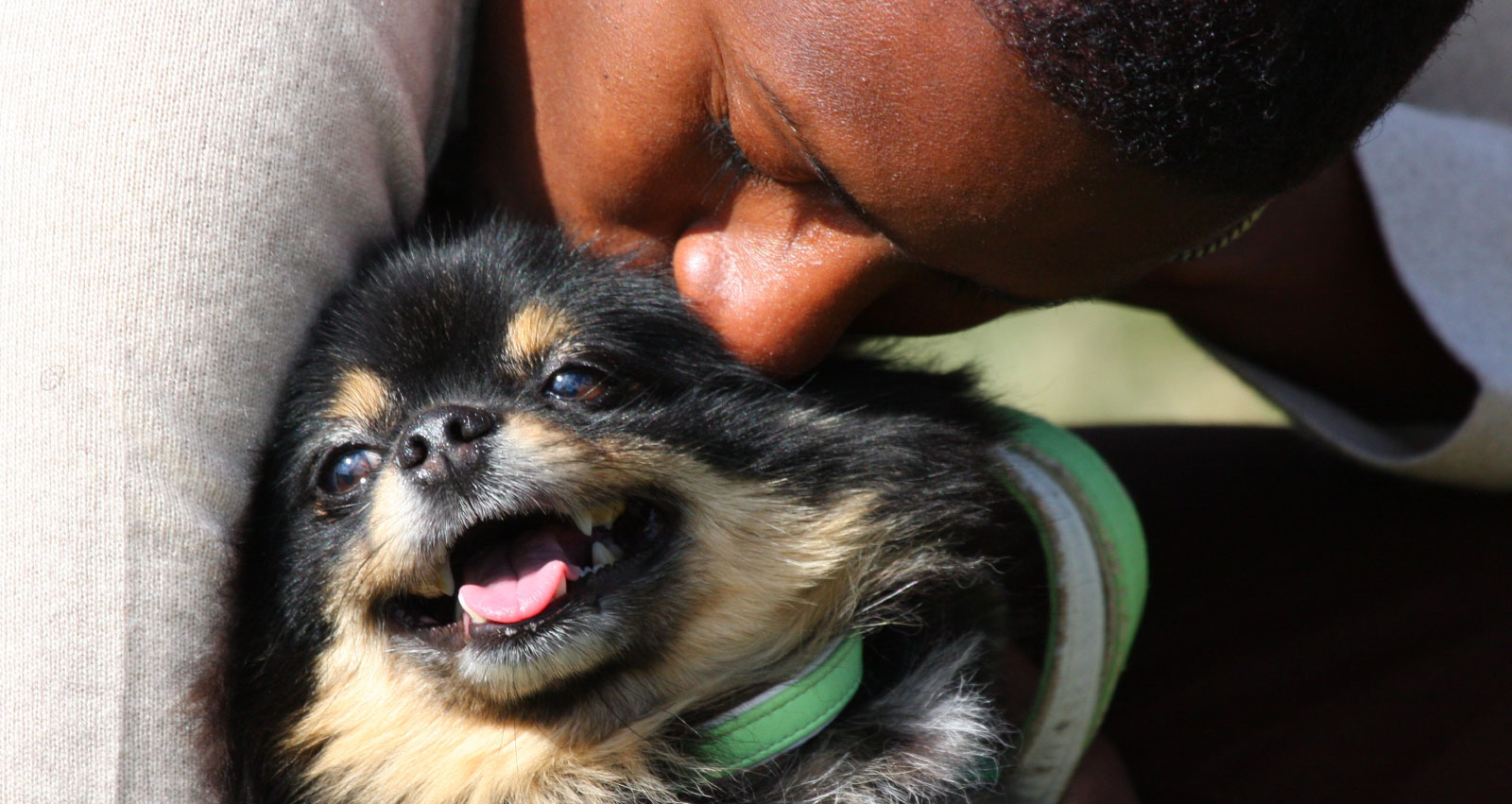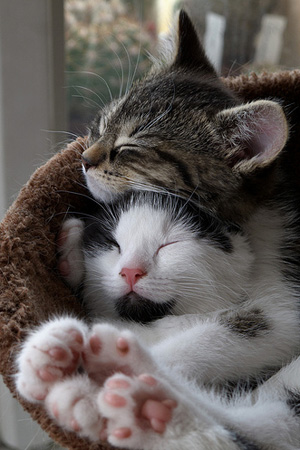Cancer Therapies for Pets: Part 1
Dealing With the Emotional Effects of Cancer in Your Pets

In this three-part series, I’m going to discuss the issue of cancer. Part 1 addresses the emotional effects of discovering that your furry friend has cancer. Part 2 explores treatment options through conventional medicine. Part 3 discusses holistic treatment and management options.
Over the past few years, I have seen an increase in the amount of referrals I receive for patients with cancer.
On my radio show and within past newsletters, I have often talked about the causes of cancer and how to best prevent the disease. But today, I’d like to discuss the other “side” of the issue – the component of cancer that most people don’t talk about, and that’s the emotional toll that the disease can take on the people caring for the cancer patient.
Learning That Your Pet Has Cancer
The word “cancer” is very powerful.
 It’s almost a taboo word, and can change the tone of a conversation to one of fear and dread, followed by silence.
It’s almost a taboo word, and can change the tone of a conversation to one of fear and dread, followed by silence.
If the term is used by your veterinarian to discuss your beloved pet, it can shake you to your core.
The emotional challenges of either having a pet with cancer, a loved one with cancer, or being diagnosed with cancer yourself, are rarely discussed by the medical community tasked with providing treatment to you, your family member, or your pet.
It’s important to know what to expect so that you can be prepared, and best manage the anxiety and stress you will likely feel as you move through this process on the path to healing.
It’s Okay to Feel Upset
Understand that you will experience many feelings, thoughts, and emotions
(like fear, denial, anger, frustration, depression, or hopelessness). This is okay.
What goes through your mind when you see or feel a lump on your beloved pet? The lump can make you feel like you have a lump in your throat!
What most people feel when they see or feel a tumor on their pet is fear. When you think about going to the veterinarian to check it out, you may be filled with a sense of dread. You may also feel a sense of hope (that maybe this will be nothing serious) and denial (that the lump isn’t a big deal and doesn’t require immediate veterinary attention).
It’s very important to get any lumps checked out as soon as possible, in case they are malignant.
Eventually you end up at the vet’s office. The veterinarian examines your pet and tells you the lump looks serious and is most likely cancer, but he/she needs to be sure and thus recommends a battery of blood tests, x-rays, ultrasounds, and biopsies to confirm if the tumor is malignant and determine which treatment plan would be best to follow.
When you hear the words “It’s most likely cancer,” time seems to stop, and the ground feels shaky. You cannot hear another word because you are in shock.
At this point in time and state of emotions, you cannot make sound decisions on what is best for your pet, nor should you feel pressured to do so.
Your mind may take over and you may begin to worry, and think about the worst case scenarios. Your fears may alternate with guilt, and you might start to question what you could have done differently to prevent or change this diagnosis. At this stage, many people begin to (wrongly!) blame themselves.
The more you think about things, the more you worry. Your mind fills with tough-to-answer questions, like:
- How long do we have for life expectancy?
- How much will all of this cost?
- How will I pay for all of these treatments?
- Will my pet suffer?
Finally, you may tailspin into feeling despair and hopelessness.
Take the Time to Process Your Emotions
 You may feel like you have so many decisions to make right now, but now isn’t the time to focus on finding quick answers.
You may feel like you have so many decisions to make right now, but now isn’t the time to focus on finding quick answers.
Instead, seek support from friends, loved ones, family and spiritual counselors (if applicable) to help you discover, express, and share the deeper, difficult feelings you are currently experiencing, such as fear, hopelessness, guilt, despair, etc.
Under these conditions, you cannot make decisions about what will be the best treatment plan for your pet.
You may just want to trust your veterinarian on what to do, but a conversation about “the why’s and the how much” needs to occur before you sign away your control.
In any case, I recommend taking a few days to process your feelings and consider your options before moving forward. Avoid making hasty decisions while in shock!
How to Regain Your Center
Try these breathing exercises
The best ways of getting clear on what decision to make is to first calm down and get more oxygen into your brain. Calming down and getting present is the first step back towards clarity and reality.
- You can start by taking a deep breath and holding it for 4 or 5 seconds, then releasing and holding your breath for another 4 or 5 seconds before you take another breath.
- Repeat over and over, while sitting down.
Check out these two articles for additional tips on deep breathing and using breathing to manage anxiety:
NOTE: If you have asthma, COPD, or any other lung ailment, check with your family physician first.
Although this sounds simple, breathing exercises work very well to calm the body and clear the mind.
Reconnect With Your Social Support System
Go home and get some emotional support.
All these feelings, emotions, responsibilities, and decisions can be a heavy burden to bear alone.
Call a close and dear friend or relative.
Reconnect with your ailing pets. Be with them.
 Go for a long walk with your dog in a favorite spot like the forest or along the beach. Spend time sitting near your sick kitty in his/her favorite spot in the house. Do your breathing exercises and pay attention to the energy level of both you and your pet after having some “quiet time” together.
Go for a long walk with your dog in a favorite spot like the forest or along the beach. Spend time sitting near your sick kitty in his/her favorite spot in the house. Do your breathing exercises and pay attention to the energy level of both you and your pet after having some “quiet time” together.
After getting your head clear and heart open, spend more time sitting, walking, playing, petting, and/or sharing food with your ailing pet. You want to connect with your pet’s condition to notice the degree of pain or discomfort, the current state of health, and the current state of their attitude.
The best way to do this is with the breath.
One thing I have learned from watching animals is how they use breathing to control pain, stress, and discomfort. You can “feel” what they are feeling by matching their breathing rate and depth. Ask yourself, “Is their breathing fast, shallow, irregular? What does ‘normal’ look like?”
While gently petting your pet, breathe as fast and as deep as they are. Following their breathing pattern, providing gentle petting, and being calm will get you connected.
Also take the time to appreciate your pet’s contribution to your life. Don’t stop loving them nor enjoying them because they are sick.
Healing is a Process
From a holistic standpoint, dealing with cancer (or any serious illness) requires healing for not just the patient, but also everyone within the family of that patient (i.e. the caregiver, friends, the rest of the family, etc.).
You may be thinking, “Why do I need healing when my pet is the one with the cancer?”
This can be a process of “letting go” for you as well – learning to let go of the physical, mental, and emotional reactions to a difficult situation that causes instability and disharmony within you.
Emotionally, the owners and caretakers of animals with cancer and other debilitating diseases suffer more than their pet.
Where does the suffering come from?
It comes from “not forgiving yourself ” for your limitations and shortcomings as a responsible pet owner. Many people wrongly feel guilty for not doing enough, or not having enough money to do any and/or all of the treatment options recommended.
Some people may experience feelings of bitterness towards other family members or the vet for not doing enough or not sharing enough of the burden of helping the ailing pet recover from the cancer.
Even veterinarians experience feelings of suffering and disharmony when treating cancer patients because cancer isn’t an easy disease to treat and cure.
Practice forgiveness of yourself and others, and recognize that you are all doing the best you can.
In Hawaii, there is a process called Ho’oponopono, which is the process of making peace with yourself and others. In this great video, Hawaiian healer Dr. Ihaleakala Hew Len states that “Love is the only thing that can transform illness.”
Try it for yourself, and see how it works!
From this new (and calm) state of being, you can now begin to look at what options you have and how fast you need to make a decision.
Photos via San Diego Shooter, Barb Henry, Zruda, pmarkham
